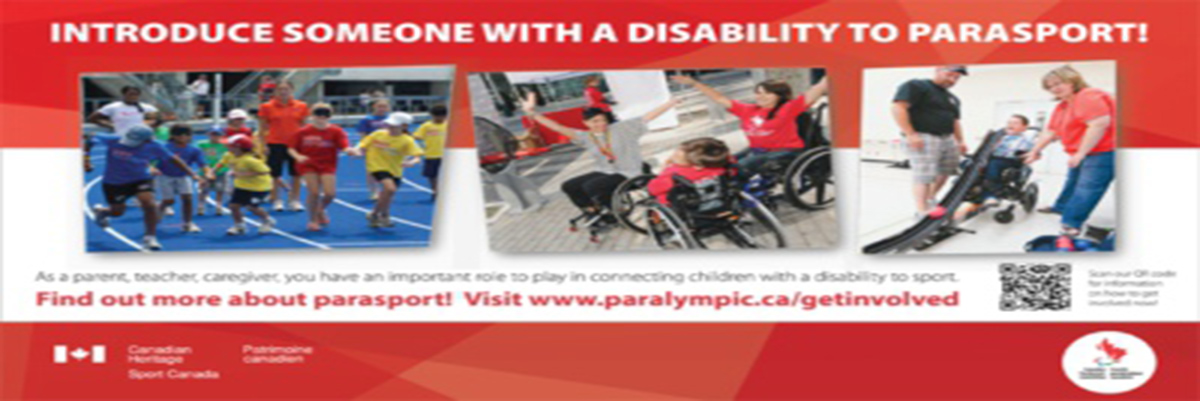Parasports
Canada has become a world power in Paralympic sport, sparked in large part by hosting the Vancouver 2010 Paralympic Winter Games, where our team placed third in the gold medal count and the Canadian Paralympic Committee secured unprecedented support for the Team. The Canadian Paralympic Team won 31 medals in the 2012 Paralympic Summer Games in London, England. Canada brought a highly competitive squad of approximately 150 athletes that all made their country proud and inspired fellow Canadians with a disability to participate in sports.
We are anxiously awaiting the 2016 Paralympic games in Rio, which will take place from September 7 to 18, 2016.
HOW MANY PARASPORTS DOES THE CANADIAN PARALYMPIC COMMITTEE WORK WITH?

There are currently 20 sports in the Paralympic Games programme, six WintReer Games and 22 Summer. Become a participant/athlete, coach, official/classifier/volunteer or help connect someone to parasport. We’ll tell you how to get involved right here!
London Games set for this summer-Canadian Paralympic Movement – A Sport for Everyone!
Courtesy of the Canadian Paralympic Committee
They left to fight in WW II as vibrant young men, but many returned from the battlefields permanently injured from combat, unsure what their future would hold. Sports seemed out of the question, until a doctor named Ludwig Guttman at England’s Stoke Mandeville Hospital forever changed the perception of what people with a disability were capable of achieving.
Guttman, who has since become known as the “Father of Sport for People with Disabilities,” recognized that sports could play a vital role in not only physical rehabilitation, but also in patients’ social and mental wellbeing.

In 1948, Guttman created the Stoke Mandeville Games – a forerunner to today’s Paralympic Games – with a goal of enhancing the quality of life for soldiers injured in the war, among them 55,000 Canadians. Sixteen athletes participated in those first Games, which offered just one event, archery.
The Games became international when athletes from the Netherlands competed in 1952, then became officially known as the Paralympic Games in 1960 and have since grown to include thousands of competitors from every continent. The Paralympics are now one of the world’s largest international, multi-sport Games!
Canada made its first appearance at the Paralympic Games in 1968 in Tel Aviv, Israel, where our athletes earned 19 medals. Four years later, at the 1972 Games in Heidelberg, Germany, Canada improved to win 20 medals. Then in August 1976, the Games came to Canadian soil, to Toronto. The event, called the Torontolympiad, yielded a historic medal count for Canada – 77 medals, 25 of them gold – and even more powerful, these Games produced a surge of national pride. Canada has become a world power in Paralympic sport, sparked in large part by hosting the Vancouver 2010 Paralympic Winter Games, where our team placed third in the gold medal count and the Canadian Paralympic Committee secured unprecedented support for the Team.
From humble beginnings to prodigious podium performances, in just four decades! An impressive showing. And an inspiration to keep on pushing!
Competition at the Paralympic Games is open to six disability groups, including athletes with amputations, visual impairments, cerebral palsy, spinal cord injuries, intellectual disabilities and “les autres,” which includes disabilities such as spina bifida, multiple sclerosis, and more.
Canada made its first appearance at the Paralympic Games in 1968 in Tel Aviv, Israel, where our athletes earned 19 medals. Four years later, at the 1972 Games in Heidelberg, Germany, Canada improved to win 20 medals. Then in August 1976, the Games came to Canadian soil, to Toronto. The event, called the Torontolympiad, yielded a historic medal count for Canada – 77 medals, 25 of them gold – and even more powerful, these Games produced a surge of national pride. Canada has become a world power in Paralympic sport, sparked in large part by hosting the Vancouver 2010 Paralympic Winter Games, where our team placed third in the gold medal count and the Canadian Paralympic Committee secured unprecedented support for the Team.
From humble beginnings to prodigious podium performances, in just four decades! An impressive showing. And an inspiration to keep on pushing!
Competition at the Paralympic Games is open to six disability groups, including athletes with amputations, visual impairments, cerebral palsy, spinal cord injuries, intellectual disabilities and “les autres,” which includes disabilities such as spina bifida, multiple sclerosis, and more.
